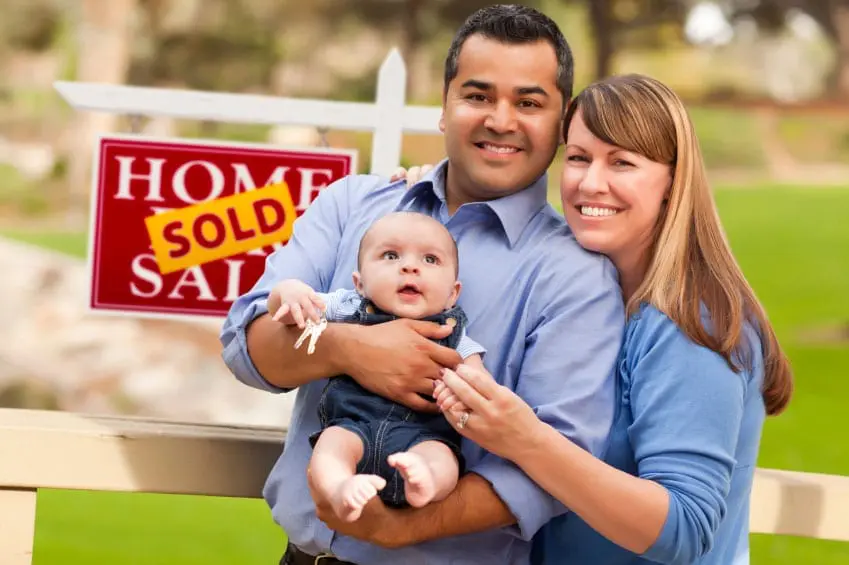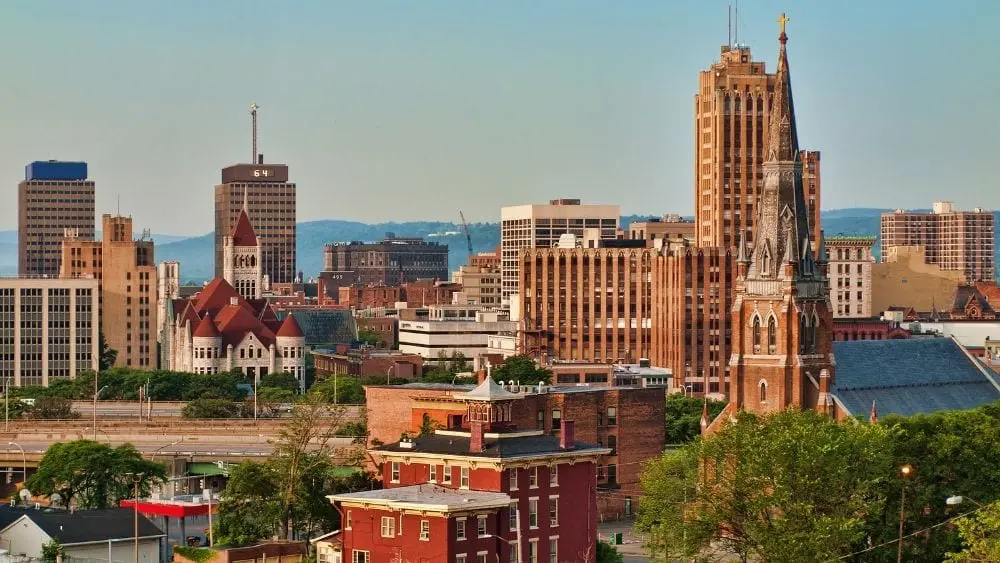
New York state is steeped in history and packed with amazing food and culture — and let’s not forget the Big Apple. There are endless reasons why homebuyers make the move here. But if you’re moving to the Empire State, make sure you’re saving up a hefty sum because New York has some of the most expensive closing costs in the country.
Closing costs make up all the administrative and legal services you’ll need to pay for before you receive the keys to your new home. Instead of paying each service provider one by one, you instead pay these expenses in a single sum on your closing date, in addition to your down payment. Ultimately, closing costs amount to about 2 percent to 5 percent of a home’s purchase price.
Because closing costs can vary by state, here’s a look at what you can expect to pay in New York, what’s typically included, and how you can potentially lower these costs.
How Much Are Closing Costs in New York?
Closing costs in New York average $8,256 for a home loan of $352,314, or 2.34 percent of the home loan, according to a 2021 report by ClosingCorp, which researches residential real estate data. That makes it the most expensive state for closing costs and second only to the District of Columbia, which, according to the ClosingCorp report, has the nation’s highest closing costs at a whopping $13,722 — or 2.41 percent of an average home loan of $568,535.
For comparison’s sake, the national average for closing costs is $6,087, and Missouri has the country’s lowest closing costs at $1,290.
Homebuyers in New York should anticipate spending far more than these initial estimates, though. ClosingCorp’s data excludes common closing costs expenses, such as loan origination fees and private mortgage insurance, which homebuyers must take out if their down payment is less than 20 percent. Both expenses can add thousands of dollars to closing costs.
Not surprisingly, home values have also crept up in New York. As of November 2021, the average sales price for a single-family home was $491,959 — up 14.4 percent from the previous November, according to the New York State Association of Realtors.
Keep in mind, closing costs will fluctuate greatly depending on a handful of factors, such as your purchase price, down payment, credit score, location, and type of mortgage.
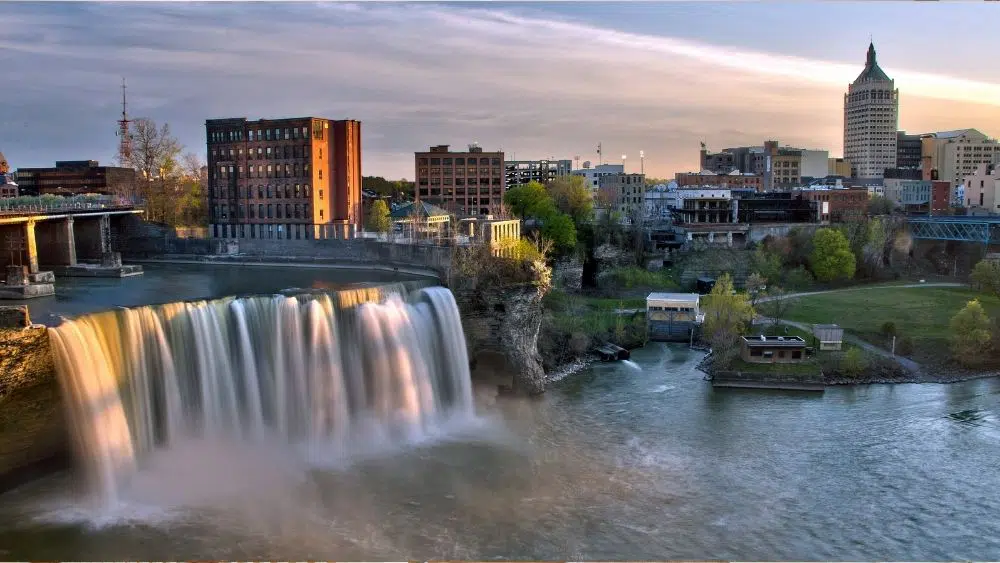
What’s Typically Included in New York’s Closing Costs?
Each state has its own set of rules when it comes to real estate closings, from hiring an attorney to paying for real estate transfer taxes. And with so many moving parts, it’s easier to group your expenses into three fee categories: mortgage-related, property-related, and annual fees.
Here’s what to expect in New York:
Mortgage-Related Fees
Unless you’re paying cash for your new home, your first stop in the homebuying process will be to a lender to secure a home loan. The following are the closing cost fees you’ll incur to set up your mortgage, including the protocol for hiring an attorney.
Loan Origination Fees
Loan origination fees are what your lender charges you to set up and process your home loan application, from preparing your application and conducting the underwrite, to producing preapproval letters for your house hunting and processing your funding at closing. Expect to spend about 0.5 to 1 percent of your loan amount on these fees.
Credit Report Fee
Just like when you apply for a credit card or personal loan, your lender will check your credit history to make sure you’re a responsible borrower. Count on the lender passing along the expense to pull your credit report from the various bureaus. If more than one borrower is on the loan application, double this cost.
Private Mortgage Insurance
If you aren’t providing a 20 percent down payment, your lender will expect you to buy private mortgage insurance, or PMI. This allows borrowers to qualify for a conventional loan even if they put down only 5 percent to 19.99 percent. While you’re paying for the insurance, the coverage is for your lender in case of default.
PMI typically ranges from 0.25 percent to 2.25 percent of your loan. Once you hit the 20 percent mark in home equity, you no longer have to pay for PMI.
Attorney Fees
In New York, buyers typically hire an attorney to help with their purchase, including closing. According to the New York City Bar Association, real estate professionals cannot draft legal documents such as the contract of sale as it could be considered unauthorized practice of law. Given the complexity of a home purchase, most buyers bring on an attorney to navigate the process. An attorney also can help with other legal aspects of the home purchase, such as preparing mortgage documents and certifying deeds, and be present on closing day to manage the deed transfer and final sign-off on contracts.
Hiring a lawyer is also essential if your home purchase is complicated, such as buying from out of state or purchasing a foreclosed home.
Legal fees will vary, depending on the complexity of the sale and where you are in the state. Some attorneys bill by the hour while others may charge a retainer fee.
Escrow Fees
Hiring a title company or escrow agent to help with the closing process is common in New York. Your title company acts as the neutral third party between you, the buyer, and the seller or home builder. They’ll hold all your funds in a third-party escrow account, so you aren’t paying the seller until the ink is dry on your home purchase.
You can also count on your title company to guide you through all the details, like buying adequate insurance policies and ordering the title search.
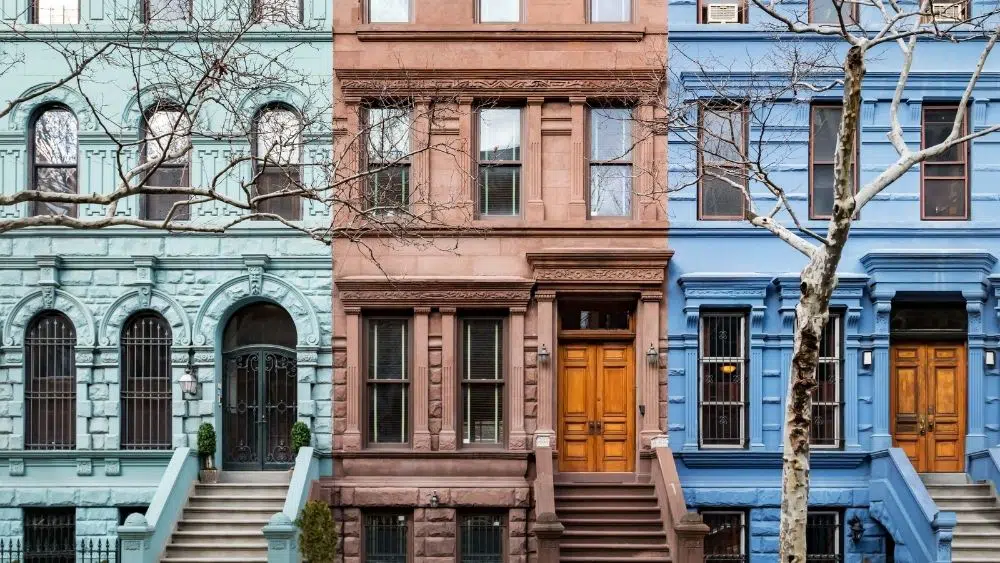
Property-Related Fees
Before taking on a decades-long home loan, you must make sure the property you’re buying clears some key checkpoints. Let’s look at some common property-related closing fees.
Title Search
When you buy property — whether a new build or an existing home — you must confirm that you’re going to own it free and clear. For this vital step, you’ll need to pay for a title examination to ensure the land you’re buying is free of ownership disputes, unpaid taxes, judgments, or outstanding lawsuits.
During a title search, an examiner pores over historical records, such as deeds, court records, and property and name indexes.
Title Insurance
After the title search is complete, your lender will expect you to buy both an owner’s and a lender’s title insurance policy. These policies stay in effect until you sell your property, protect both parties in case of “defects in title,” and cover all court costs and related fees should something go awry.
In some states, sellers pick up the owner’s title insurance policy, but in New York, it’s customary for buyers to pick up the tab for both premiums.
Real Estate Transfer Tax
Whenever real estate changes hands, buyers need to account for a real estate transfer tax as part of their closing costs. Sometimes it’s called a deed tax, a mortgage registry tax, or a documentary stamp tax.
In New York, this tax is at a rate of $2 for every $500 of property value, according to the state’s Department of Taxation and Finance. If you’re buying a property that’s priced at $1 million or more, you’ll also incur a “mansion tax” that’s an additional 1 percent of the home’s sale price.
Homebuyers also need to account for a mortgage recording tax, which is charged to document your home loan at the city or county level. The rate starts at a basic tax of $0.50 for every $100 of mortgage debt but can go to as high as $1.50, depending on the size of your home loan and the jurisdiction you live in.
Property Appraisal
Before closing, the lender will send a third-party appraiser to your potential new home to make sure it’s priced at the right value. The appraisal is a crucial step in the homebuying process; if you default on your home loan, your lender needs to know they can sell the property to cover the outstanding balance.
The appraiser will evaluate the home’s size, features, and condition, as well as how it stacks up to homes priced similarly in the community, to determine its fair market value. While your lender delegates this step, you’re on the hook for the bill.
Home Inspection
For your peace of mind, hire a home inspector to check on the nuts and bolts of your new home to make sure everything is in good running order. Your home inspector will check on the health of the property, including the roof, HVAC system, major appliances, and plumbing and electrical work.
Pay attention to their insight: Your inspector will flag any existing issues as well as ones that could surface in the coming years. With this intel, you can negotiate with the seller regarding any fixes before finalizing the deal.
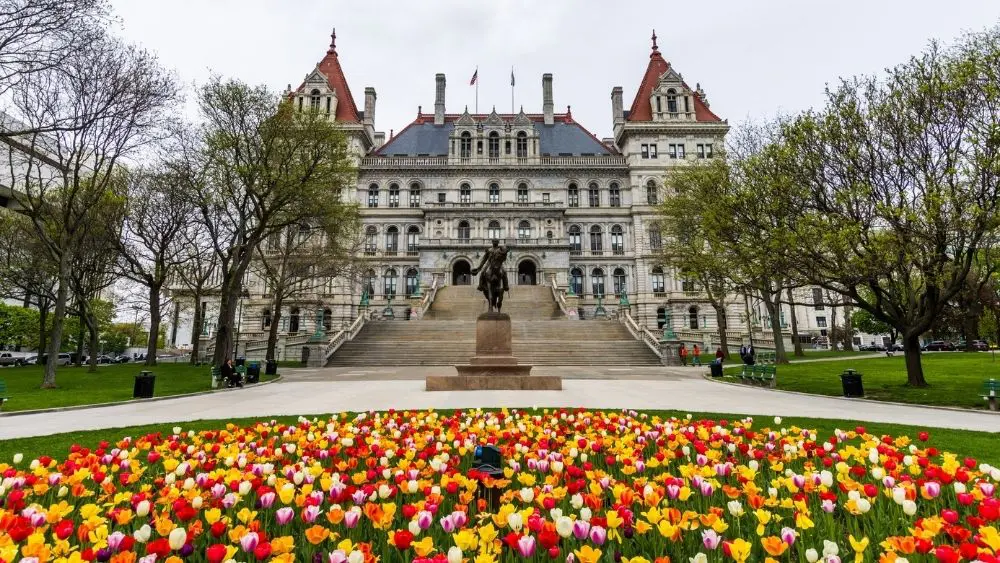
Annual Fees
Between utility bills and monthly mortgage payments, owning property is an endless cycle of bills. Your closing costs will include a handful of fees you’ll need to start paying annually.
Homeowner’s Insurance
Before closing, homebuyers must obtain homeowner’s insurance for the upcoming year. Lenders make this purchase mandatory before transferring your mortgage.
Home insurance is vital to have in effect when you take ownership because it covers any physical damage to your home caused by fire, wind, vandalism, or theft. This is a prepaid expense, meaning it must be paid at closing and can’t be rolled into your home financing.
You’ll also need to determine whether you should add extended policies to your coverage, such as those that cover certain natural disasters.
Property Taxes
In New York, homeowners pay, on average, 1.40 percent of their home’s assessed market value in property taxes, according to the Tax Foundation, a tax policy nonprofit. The precise rate will vary depending on the taxes levied in the county you’re moving to. Overall, the state has expensive property taxes compared to the rest of the country.
Keep in mind, you may qualify for property tax exemptions if you’re a senior, veteran, or living with a disability.
This is another prepaid expense that can’t be rolled into financing. Due dates vary, depending on your county. Check the dates for your municipality and mark them on your calendar.
Homeowners Association Fees
Thirty-five percent of homeowners in New York are part of a homeowners’ association, or HOA, so there’s a big chance you will need to pay prorated dues at closing. HOA fees include covering the cost of clubhouses, pools, and fitness centers, along with maintenance like trash removal and security. The more services your HOA offers, the more you’ll shell out in fees.
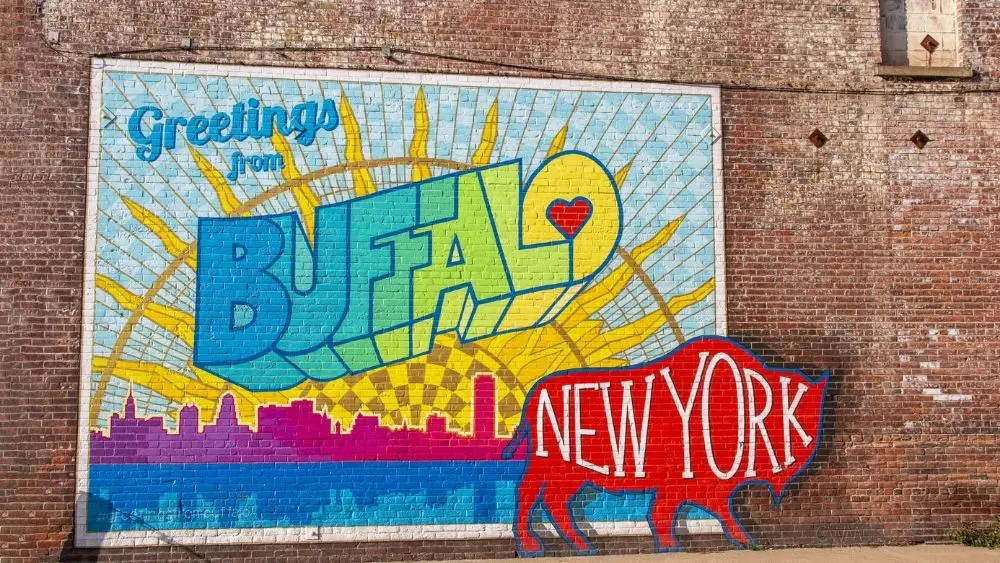
How Can I Lower My Closing Costs in New York?
With the priciest closing costs in the entire country, homebuyers in New York may be grappling with some sticker shock. But here’s a rundown of key strategies that could save you some money.
Closing Cost Assistance
New York’s homeownership assistance programs offer ways to help cut back on closing costs.
If you’re a first-time homebuyer, you could be eligible for a New York State Association of Realtors Housing Opportunities Foundation Grant, which provides up to $2,000 to contribute toward your down payment and closing costs. The State of New York Mortgage Agency also has a down payment assistance loan that providers eligible homebuyers with a low interest rate, deferred monthly payments, and the potential to have the loan forgiven altogether.
Check out regional programs too. Auburn, Babylon, Buffalo, Cortland County, Essex County, Ithaca, and Long Island are just some of the areas that run their own down payment and closing cost assistance programs.
Comparison Shop
Whether you’re looking for a title company, an inspector, or a surveyor, shop around to make sure you’re getting the best deal. Some title companies or lenders have a list of go-to professionals that they’ve approved. Using their referrals may come with steep discounts.
Get Your Finances in Shape
Before shopping for a home loan, focus on improving your credit score as much as you can. With a great credit history, you may be able to secure a lower interest rate and more competitive terms for your loan. This move could save you thousands of dollars over the lifetime of your mortgage.
Apply as much as you can toward your down payment too. The closer you get to the 20 percent threshold, the less you’ll have to pay in PMI.
Seller Concessions
Negotiating the home sale is part of the homebuying process, especially if you’re in a buyer’s market and your seller or builder is eager to offload their property.
There are many ways you can try to reassign some of the closing costs: You can submit a full-price offer with a caveat that the seller must pick up all your closing costs. If you’re building a new home, you can ask the builder to pay a portion of the closing costs.
Negotiate Lender Fees
If you have a longstanding, established relationship with your lender, you may have some wiggle room with your loan setup fees. You could ask your lender to omit certain expenses from your bill, such as rate lock fees, loan processing fees, or broker rebates. If that doesn’t work, you could also ask to stagger these expenses, so they’re paid in stages instead of all at once at closing.
No-Closing-Cost Mortgages
With a “no-closing-cost” mortgage, your lender agrees to pay for part or all your closing costs, but you must pay a higher interest rate. Be careful with this option: It could cost you more money overall because of the bump in your interest rate.
Add Closing Costs to Your Home Financing
Aside from the prepaid expenses that must be paid at closing, you could opt to roll your closing costs into your home loan. This could add thousands of dollars to your mortgage. You won’t have to pay for closing costs on closing day, but your monthly mortgage payments will be a bit higher.

Carmen Chai is an award-winning Canadian journalist who has lived and reported from major cities such as Vancouver, Toronto, London and Paris. For NewHomeSource, Carmen covers a variety of topics, including insurance, mortgages, and more.
 The Most Affordable Cities in New York
The Most Affordable Cities in New York